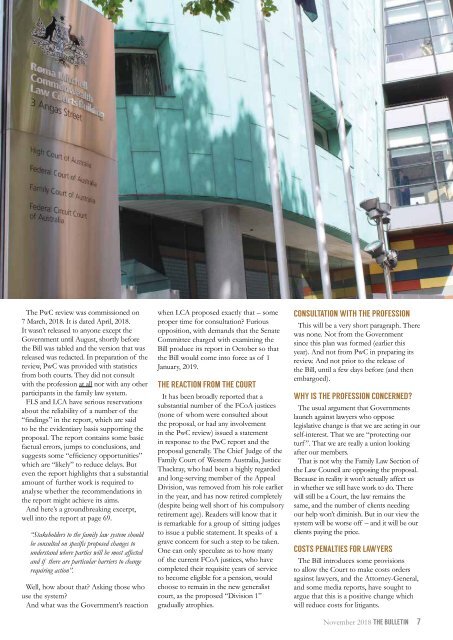LSB November 2018_Web
You also want an ePaper? Increase the reach of your titles
YUMPU automatically turns print PDFs into web optimized ePapers that Google loves.
The PwC review was commissioned on<br />
7 March, <strong>2018</strong>. It is dated April, <strong>2018</strong>.<br />
It wasn’t released to anyone except the<br />
Government until August, shortly before<br />
the Bill was tabled and the version that was<br />
released was redacted. In preparation of the<br />
review, PwC was provided with statistics<br />
from both courts. They did not consult<br />
with the profession at all nor with any other<br />
participants in the family law system.<br />
FLS and LCA have serious reservations<br />
about the reliability of a number of the<br />
“findings” in the report, which are said<br />
to be the evidentiary basis supporting the<br />
proposal. The report contains some basic<br />
factual errors, jumps to conclusions, and<br />
suggests some “efficiency opportunities”<br />
which are “likely” to reduce delays. But<br />
even the report highlights that a substantial<br />
amount of further work is required to<br />
analyse whether the recommendations in<br />
the report might achieve its aims.<br />
And here’s a groundbreaking excerpt,<br />
well into the report at page 69.<br />
“Stakeholders to the family law system should<br />
be consulted on specific proposed changes to<br />
understand where parties will be most affected<br />
and if there are particular barriers to change<br />
requiring action”.<br />
Well, how about that? Asking those who<br />
use the system?<br />
And what was the Government’s reaction<br />
when LCA proposed exactly that – some<br />
proper time for consultation? Furious<br />
opposition, with demands that the Senate<br />
Committee charged with examining the<br />
Bill produce its report in October so that<br />
the Bill would come into force as of 1<br />
January, 2019.<br />
THE REACTION FROM THE COURT<br />
It has been broadly reported that a<br />
substantial number of the FCoA justices<br />
(none of whom were consulted about<br />
the proposal, or had any involvement<br />
in the PwC review) issued a statement<br />
in response to the PwC report and the<br />
proposal generally. The Chief Judge of the<br />
Family Court of Western Australia, Justice<br />
Thackray, who had been a highly regarded<br />
and long-serving member of the Appeal<br />
Division, was removed from his role earlier<br />
in the year, and has now retired completely<br />
(despite being well short of his compulsory<br />
retirement age). Readers will know that it<br />
is remarkable for a group of sitting judges<br />
to issue a public statement. It speaks of a<br />
grave concern for such a step to be taken.<br />
One can only speculate as to how many<br />
of the current FCoA justices, who have<br />
completed their requisite years of service<br />
to become eligible for a pension, would<br />
choose to remain in the new generalist<br />
court, as the proposed “Division 1”<br />
gradually atrophies.<br />
CONSULTATION WITH THE PROFESSION<br />
This will be a very short paragraph. There<br />
was none. Not from the Government<br />
since this plan was formed (earlier this<br />
year). And not from PwC in preparing its<br />
review. And not prior to the release of<br />
the Bill, until a few days before (and then<br />
embargoed).<br />
WHY IS THE PROFESSION CONCERNED?<br />
The usual argument that Governments<br />
launch against lawyers who oppose<br />
legislative change is that we are acting in our<br />
self-interest. That we are “protecting our<br />
turf ”. That we are really a union looking<br />
after our members.<br />
That is not why the Family Law Section of<br />
the Law Council are opposing the proposal.<br />
Because in reality it won’t actually affect us<br />
in whether we still have work to do. There<br />
will still be a Court, the law remains the<br />
same, and the number of clients needing<br />
our help won’t diminish. But in our view the<br />
system will be worse off – and it will be our<br />
clients paying the price.<br />
COSTS PENALTIES FOR LAWYERS<br />
The Bill introduces some provisions<br />
to allow the Court to make costs orders<br />
against lawyers, and the Attorney-General,<br />
and some media reports, have sought to<br />
argue that this is a positive change which<br />
will reduce costs for litigants.<br />
<strong>November</strong> <strong>2018</strong> THE BULLETIN 7


















